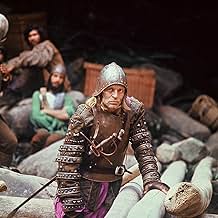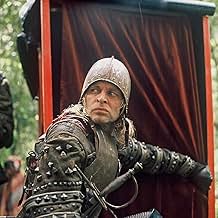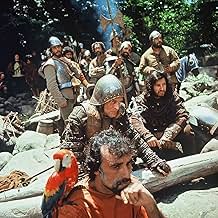Im 16. Jahrhundert leitet der grausame und wahnsinnige Don Lope de Aguirre eine spanische Expedition, die auf der Suche nach El Dorado ist.Im 16. Jahrhundert leitet der grausame und wahnsinnige Don Lope de Aguirre eine spanische Expedition, die auf der Suche nach El Dorado ist.Im 16. Jahrhundert leitet der grausame und wahnsinnige Don Lope de Aguirre eine spanische Expedition, die auf der Suche nach El Dorado ist.
- Auszeichnungen
- 4 Gewinne & 3 Nominierungen insgesamt
Claus Biederstaedt
- Brother Gaspar de Carvajal
- (Synchronisation)
- (Nicht genannt)
Lothar Blumhagen
- Don Pedro de Ursua
- (Synchronisation)
- (Nicht genannt)
Heinz Theo Branding
- Don Fernando de Guzman
- (Synchronisation)
- (Nicht genannt)
Christian Brückner
- Balthasar
- (Synchronisation)
- (Nicht genannt)
Empfohlene Bewertungen
Klaus Kinski's enigmatic and frightening portrayal of man's obsession in Werner Herzog's nightmare masterpiece Aguirre: The Wrath Of God is a German film that is as powerful today as it was when released back in 1972. Kinski and Herzog's absolute real life hate for one another only makes the film more real in its depiction of a man driven to the edge of sanity as his obsession for a mythical treasure - so obsessed that he sacrifices all that is precious to him in finding it. Like the 'Mosquito Coast', an almost identical film, it concentrates on the human condition, in how far 'man' can go in his quest of becoming God. Werner Herzog, who's persistence in Klaus Kinski to star in most of his films, is a master storyteller and one great director, famous for other films starring Kinski including "Fitzcarraldo" and "Woyzeck". "Aguirre: The Wrath Of God", however, is his and Klaus Kinski's most famous and one of the most powerful films of all time.
Entirely a true story, set in the 1600s, following the annihilation of the Incas Empire, when the Spanish Conquistadors explored and roamed most of South America, a legendary expedition set out in Peru into the Amazon River to locate the mythical City Of Gold, El Dorado. Pizarro, the leader of the expedition comes to the point where he must turn and head back to civilization, following a long and tormenting journey that ultimately led them to nowhere. Fearing they'll get lost in the uncharted jungles of the Amazon, he sends a smaller group to complete the journey and commands them to return within a few days if no Gold is found. It is only a matter of time before this group faces unbearable difficulties down the Amazon River. Fearing the leader of their new group might turn back to prevent any more men being killed, Don Lope de Aguirre (Kinski) inspires a mutiny and manipulates the men in believing that with the riches they would find they wouldn't need to go home. They must battle with the native enemy they can't see and walk through the most difficult terrain on a most terrifying quest. What follows is a devastating character study of human nature and how one's obsession can destroy him and everything that really matters.
This film comes as a rarity in our world gone mad - a world controlled by greedy, obsessed and powerful dehumanized people. Klaus Kinski was one of the world's most profound and versatile actors. His rough, striking and villainous exterior gave him an almighty presence. He creates such a vividly obsessed and evil character in the film, you are easily convinced he is for real. I believe his abhorrence for Werner Herzog assisted him in his performance. Never during filming did they ever share ideas, always opposing and showing one's hatred for one another, which leaves people questioning their constant repairing. But Werner Herzog makes no mistake when casting Kinski in his films. Kinski drives the film, sometimes completely on his own. Werner Herzog's films are always extremely deep, philosophical and mythical. The cinematography is consistently breathtaking and never fails to transport you to the world Herzog intends to take you. And music perfectly paints the picture of human degradation, with its slow, subtle and haunting tone. It sticks in your head long after the conclusion and adds immensely to the the power of the film.
'Aguirre: The Wrath Of God', much like 'The Mosquito Coast', is one of the most poignant character studies in film history. It is in German with subtitles, but you are bound to forget they are there, as this epic film will take you to the vast and dehumanizing Amazon on an adventurous journey you will never forget. See this for the adventure if not for the underlining depth. It is a master work from a unique artist that is Werner Herzog and made a classic by the colossal Klaus Kinski. A beautiful and haunting experience that is not to be missed.
Entirely a true story, set in the 1600s, following the annihilation of the Incas Empire, when the Spanish Conquistadors explored and roamed most of South America, a legendary expedition set out in Peru into the Amazon River to locate the mythical City Of Gold, El Dorado. Pizarro, the leader of the expedition comes to the point where he must turn and head back to civilization, following a long and tormenting journey that ultimately led them to nowhere. Fearing they'll get lost in the uncharted jungles of the Amazon, he sends a smaller group to complete the journey and commands them to return within a few days if no Gold is found. It is only a matter of time before this group faces unbearable difficulties down the Amazon River. Fearing the leader of their new group might turn back to prevent any more men being killed, Don Lope de Aguirre (Kinski) inspires a mutiny and manipulates the men in believing that with the riches they would find they wouldn't need to go home. They must battle with the native enemy they can't see and walk through the most difficult terrain on a most terrifying quest. What follows is a devastating character study of human nature and how one's obsession can destroy him and everything that really matters.
This film comes as a rarity in our world gone mad - a world controlled by greedy, obsessed and powerful dehumanized people. Klaus Kinski was one of the world's most profound and versatile actors. His rough, striking and villainous exterior gave him an almighty presence. He creates such a vividly obsessed and evil character in the film, you are easily convinced he is for real. I believe his abhorrence for Werner Herzog assisted him in his performance. Never during filming did they ever share ideas, always opposing and showing one's hatred for one another, which leaves people questioning their constant repairing. But Werner Herzog makes no mistake when casting Kinski in his films. Kinski drives the film, sometimes completely on his own. Werner Herzog's films are always extremely deep, philosophical and mythical. The cinematography is consistently breathtaking and never fails to transport you to the world Herzog intends to take you. And music perfectly paints the picture of human degradation, with its slow, subtle and haunting tone. It sticks in your head long after the conclusion and adds immensely to the the power of the film.
'Aguirre: The Wrath Of God', much like 'The Mosquito Coast', is one of the most poignant character studies in film history. It is in German with subtitles, but you are bound to forget they are there, as this epic film will take you to the vast and dehumanizing Amazon on an adventurous journey you will never forget. See this for the adventure if not for the underlining depth. It is a master work from a unique artist that is Werner Herzog and made a classic by the colossal Klaus Kinski. A beautiful and haunting experience that is not to be missed.
This is neither the masterwork nor the garbage most people see in it. Sure, it has a lot of very strong points - Kinski's acting, a fascinating plot, the original settings, some good cinematography and an unforgettable closing scene. However, the movie seriously suffers from awkward cuts and terrible dramaturgy; and, worst of all, the stiff dialogues and the amateur-class acting of almost everybody besides Kinski (you will note both especially if you speak German) make some scenes unbearable. So all in all, while it may have the potential to be a really great movie, it delivers only sometimes, and in order to call it a masterpiece, you would have to be very generous and overlook many flaws ...
... in his pursuit of the gold of El Dorado while exhibiting incestuous thoughts towards his daughter and a belief he is god - with a supporting cast of treason, mutiny, murder, slavery, cannibalism and monkeys: you consider yourself fortunate not to have been part of the Spanish, or indeed any countries ruthless empire building in the past.
You are however grateful, for the vision and inspirational insight brought to you by Werner Herzog, leaving you transfixed by the pioneers plight, surroundings (visual and audible), naivety and ignorance in their futile quest for immortality and riches. When you couple all this with the challenges of the films gestation, the time of its inception and the instability and unpredictable nature of Klaus Kinski; that it was ever birthed in the first instance turns it into a treasure worth discovering, or rediscovering if you've mislaid your ability to explore new cinematic horizons.
You are however grateful, for the vision and inspirational insight brought to you by Werner Herzog, leaving you transfixed by the pioneers plight, surroundings (visual and audible), naivety and ignorance in their futile quest for immortality and riches. When you couple all this with the challenges of the films gestation, the time of its inception and the instability and unpredictable nature of Klaus Kinski; that it was ever birthed in the first instance turns it into a treasure worth discovering, or rediscovering if you've mislaid your ability to explore new cinematic horizons.
A Spanish expedition is sent out to travel deep into the jungle and find the legendary city of El Dorado and recover its gold for the throne of Spain. Quickly the expedition gets into trouble and leader Don Pedro de Ursua decides that they must turn back. However to do this is not an option to Don Lope de Aguirre, who leads a violent rebellion, culling those loyal to Ursua and officially breaking off ties with Spain. The group continue down the river in search of their goal but conditions are hard and it is only the increasingly unrealistic aims of Aguirre that drives them onwards.
In both the film and the making of the film this is best sold as a medieval Apocalypse Now as it has a great collection of stories behind it while also being an interesting journey into the mouth of madness. The "making of" is told better other places than I can do here so I shan't bother, but suffice to say that at times the film feels like Herzog is just watching his cast to see what happens and not just following his characters. The plot sees them gradually fall from the pomp and civility that they start the film with and this is no surprise, but the manner in which it happens is still interesting and engaging. Some viewers may find it going where they expect it to, but this should not surprise anyone and it shouldn't stop the majority of people enjoying the journey.
Herzog's direction is strong throughout. He does well with what was a very difficult shoot and he gets plenty of strong shots out of it all of which still stand up as being impressive by today's standards. His direction of actors may not have been quite as good but the performances are still very good. Kinski is very strong in the lead role and, whether acting or not, he is totally convincing as he loses touch with reality. The support are all good, although Kinski is obviously where the picture is.
Overall an impressive film that is more worthwhile watching because of the stories behind it. The narrative may be simple and obvious enough but it is still very engaging as a journey or rather descent. Is maybe praised a little bit too highly by some but is a fascinating film regardless.
In both the film and the making of the film this is best sold as a medieval Apocalypse Now as it has a great collection of stories behind it while also being an interesting journey into the mouth of madness. The "making of" is told better other places than I can do here so I shan't bother, but suffice to say that at times the film feels like Herzog is just watching his cast to see what happens and not just following his characters. The plot sees them gradually fall from the pomp and civility that they start the film with and this is no surprise, but the manner in which it happens is still interesting and engaging. Some viewers may find it going where they expect it to, but this should not surprise anyone and it shouldn't stop the majority of people enjoying the journey.
Herzog's direction is strong throughout. He does well with what was a very difficult shoot and he gets plenty of strong shots out of it all of which still stand up as being impressive by today's standards. His direction of actors may not have been quite as good but the performances are still very good. Kinski is very strong in the lead role and, whether acting or not, he is totally convincing as he loses touch with reality. The support are all good, although Kinski is obviously where the picture is.
Overall an impressive film that is more worthwhile watching because of the stories behind it. The narrative may be simple and obvious enough but it is still very engaging as a journey or rather descent. Is maybe praised a little bit too highly by some but is a fascinating film regardless.
Stunning, dreamlike film documents (in a somewhat documentary style), the story of Don Lope de Aguirre (Klaus Kinski), who leads a group of Spanish conquistadors into the depths of the jungle in search for El Dorado, the mythical city of gold. Beautiful cinematography and locations place the viewer into the heart of the jungle, where they witness firsthand Aguirre's descent into madness. Continually interesting and exciting, it features some of the greatest images ever committed to film, most notably the opening and closing shots of the movie.
Wusstest du schon
- WissenswertesDuring a particularly rowdy night of production, Klaus Kinski, irritated by the noise from a hut where cast and crew were playing cards, repeatedly fired with a Winchester rifle into it. One of the bullets took the tip of an unnamed extra's finger off. Werner Herzog immediately confiscated the weapon and it remains his property to this day.
- PatzerThe indigenous Peruvians wear clothes that were imported by Europeans in the 19th century.
- Zitate
Don Lope de Aguirre: That man is a head taller than me. That may change.
- Alternative VersionenThe early 2000's DVD release is missing the opening shot (after the text scroll) of the clouds parting to reveal the mountains. It simply opens on the shot following the line of people descending the narrow mountain trail. It also is missing the title credits over the river water. Earlier U.S. video versions were missing these titles as well, but kept the footage so that the film had several seemingly unmotivated long shots of the flowing water.
- VerbindungenEdited into Spisok korabley (2008)
- SoundtracksAguirre, Der Zorn Gottes (Lacrime Di Re)
Written by Florian Fricke
Performed by Popol Vuh
Published by Edition Intro Meisel
Courtesy of Gammarock Music
Top-Auswahl
Melde dich zum Bewerten an und greife auf die Watchlist für personalisierte Empfehlungen zu.
Details
- Erscheinungsdatum
- Herkunftsländer
- Sprachen
- Auch bekannt als
- Aguirre, la ira de Dios
- Drehorte
- Huayna Picchu, Peru(mountain with stone stairway in the opening scene)
- Produktionsfirmen
- Weitere beteiligte Unternehmen bei IMDbPro anzeigen
Box Office
- Budget
- 370.000 $ (geschätzt)
- Weltweiter Bruttoertrag
- 37.794 $
Zu dieser Seite beitragen
Bearbeitung vorschlagen oder fehlenden Inhalt hinzufügen




















